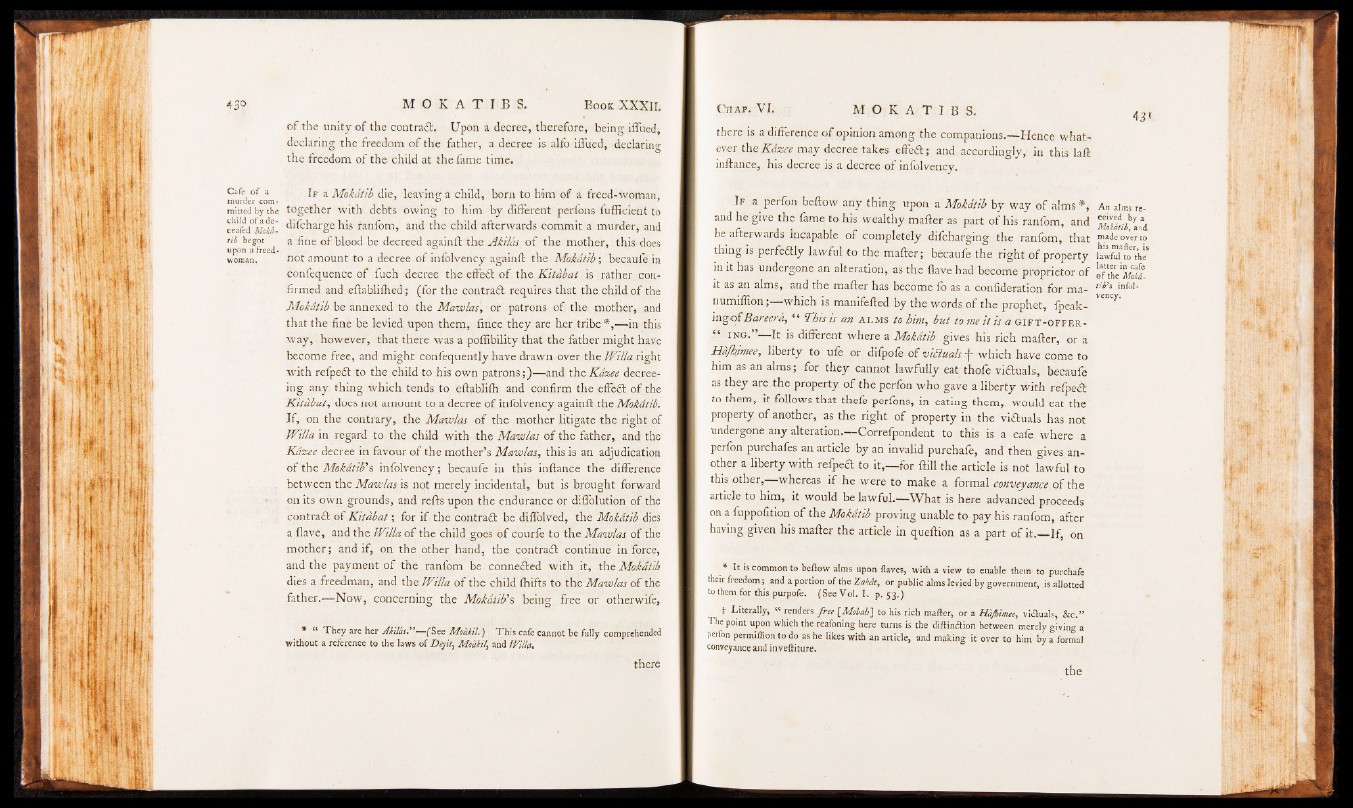
of the unity of the contract. Upon a decree, therefore, being iffued,
decla ring the freedom of the father, a decree is alfo iffued, declaring'
the freedom of the child at the fame time.
Cafe o f a I f a Mokdtib die, leaving a child, born to him of a freed-woman.
murder com- ° 1
mitted by the together with debts owing to him by different perfons fufficient to
ceafed°McfJ- ^^^-harge his ranfom, and the child afterwards commit a murder, and
tib begot a fine of blood be decreed againft the Akilas of the mother, thia does
upon a freed- . .
woman. not amount to a decree of infolvency againft the Mokdtib; becaufe in
confequence of fuch decree the effed of the Kitabat is rather confirmed
and eftablifhed; (for the contrad requiresthat the child o f the
Mokdtib be annexed to the Mawlas, or patrons of the mother, and
that the fine be levied upon them, fince they are h.er tribe * ,— in this
way, however, that there was a poffibility that the father might have
become free, and might confoquently have drawn over the W illa right
with refpedt to the child to his own patrons;)— and the Kdzee degreeing
any thing which, tends to eftablilh and confirm the effedt of the
Kitabat., does not amount to a decree of infolvency againft the Mokdtib.
If, on the contrary, the Mawlas o f the mother litigate the right of
Willa in regard to the child with the Mawlas of the father, and the
Kdzee decree in favour of the mother’s Mawlas, this is an adjudication
of the Mokatib'& infolvency; becaufe in this infiance the difference
between the Mawlas is not merely incidental, but is brought forward
on its own grounds, and refts upon the endurance or diffolution of the
contrad of Kitabat; for i f the contract be diflolved, the Mokdtib dies
a Have, and the Willa of the child goes of courfe to the Mawlas of the
mother; and if, on the other hand, the contract continue in force,
and the payment of the ranfom be connected with it, the Mokatib
dies a freedman, and the Willa of the child Ihifts to the Mawlas of the
father.— Now, concerning the Mokdtib’ s being free or otherwife,
* “ T h e y are her j t k i l a s — fS e e Moul.il.) T h is cafe cannot be fuiiy comprehended
without a reference to the laws o f Deyit, Madid\ and Willa,
there
there is a difference o f opinion'among the companions.— Hence whatever
the Kdzee may decree takes effed; and accordingly, in this laft
inftance, his decree is a decree of infolvency.
If a perfon beftow any thing upon a Mokdtib by way of alms
and he give the fame to his wealthy mafter as part of his ranfom, and
be afterwards Incapable of completely difcharging the ranfom, that
thing is perfedly lawful to the mafter; becaufe the right of property
in it has undergone an alteration, as the Have had become proprietor of
it as an alms, and the mafter has become fo as a confederation for ma-
numiflion ;— which is manifefted by the words of the prophet, fpeak-
in gqfBareera, ÉC Id’hists an alms to him, but to me it is a g if t -offer-
“ ing.”— It is different where a Mokdtib gives his rich mafter, or a
Hd/bjmi’e, liberty to ufo or difpofo of victuals ■ ƒ• which have come to
him as an alms ; for they cannot lawfully eat thofe viduals, becaufe
as they are the property of the perfon who gave a liberty with refped
to them, it follows that thefe perfons, in eating them, would eat the
property o f another, as the right of property in the viduals has not
undergone any alteration.— Correfpondent to this is a cafe where a
perfon purchafes an article by an invalid purchafe, and then gives another
a liberty with refped to it,— for ftill the article is not lawful to
this other, whereas i f he were to make a formal conveyance of the
article to him, it would be lawful.— What is here advanced proceeds
on a fuppofition o f the Mokdtib proving unable to pay his ranfom, after
having given his mafter the article in queftion as a part of it.— If, on
An alms received
by a
Mokdtib, and
made over to
his mafter, is
lawful to the
latter in cafe
o f the Mokdtib’s
infolvency.
* It is common to beftow alms upon flaves, with a view to enable them to purchafe
their freedom; and a portion o f the Zakat, or public alms levied by government, is allotted
to them for this purpofe. (See V o l. I . p. 5 3 .)
t Literally, « renders f r i t [ M M ] to his rich mafter, or a Hdjhimec, v id u a ls , & c . ”
The point upon which the reafoning here turns is the diftindion between merely giving a
perfon permiflion to do as he likes with an article, and making it over to him by a formal
conveyance and inveftiture.
the
;|g